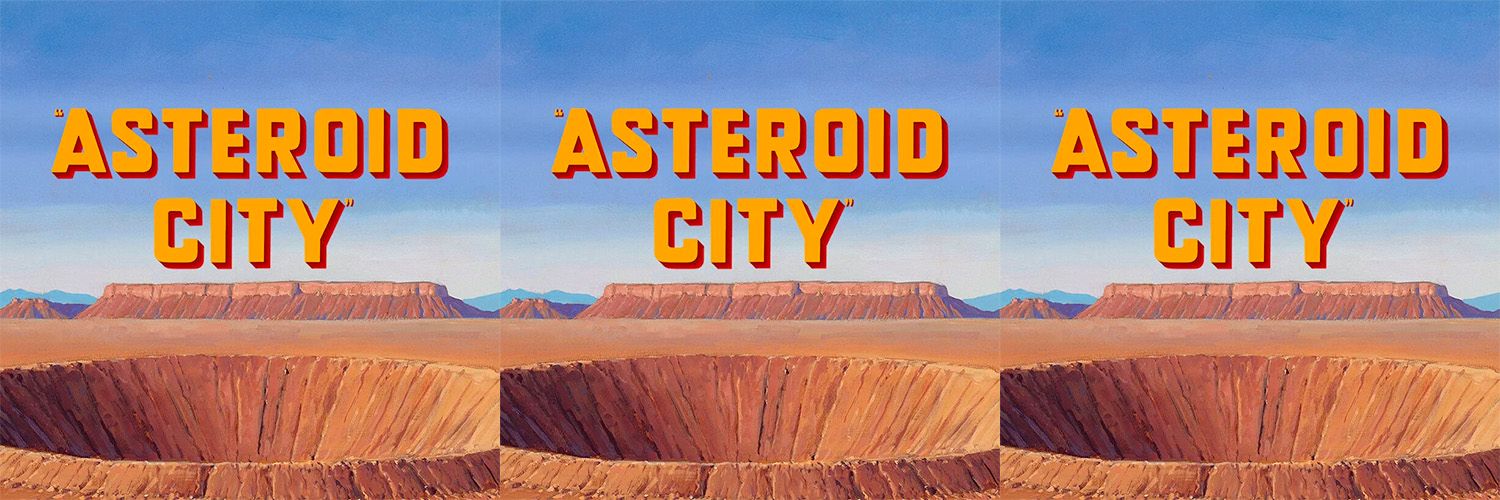Dear Internet, it’s been a while. Sorry for the delay.
I’ve just gotten back from the theater, and needless to say, am still digesting Wes Anderson’s Asteroid City for all that it is. Though a relatively short film, running just an hour forty-five, it’s surprisingly dense (save for the second act, which was a bit slow for my liking). I expect another two or three viewings will be necessary to appreciate it for all it is.
When people think of Wes Anderson, they think of an aesthetic. If you’re a fan, worry not, Asteroid City will certainly quench your thirst for beautiful symmetry, saturated colors, and meticulously orchestrated camera movement. Anderson’s painterly vision is enough to discuss on its own merits but make no mistake, the film thrives not on the pictures themselves but the story — the reckoning — that underpins them. The plot is inconsequential. If anything, it’s a vector of discontinuity, stumbling along to keep you engaged… to keep you thinking.
Asteroid City is a film strengthened by the social contract of the theater. When do you laugh? When do others laugh? When is there silence? With Anderson’s compositions, a big screen is critical. It forces your insertion into the fabric of the film as you wrestle with where to look. What gets your attention, and what hides in the periphery? The film oscillates between a 1.37:1 aspect ratio and one of 2.39:1. In many a scene, Anderson makes you yearn for more. Such is particularly intense in the academy ratio shots when he positions an actor ever-so-slightly in the frame — the tip of a nose or half of a foot visible, the remainder of the screen’s width obstructed by blackness. Heightening this feeling is Asteroid City’s consistent use of anamorphic lenses. Those boxy shots feel so insufficient; the screen’s width beckons for more and, in doing so, holds your gaze.
Indeed, with Augie Steenbeck (played by Jason Schwartzman), our main character, being a war photographer, the interaction of the image and the audience is paramount — as is the interaction of the image maker and the image’s subject. While eating at a diner, Steenbeck photographs the celebrity actor Midge Campbell (played by Scarlett Johansson). Campbell stoically accuses Steenbeck, ”You didn’t ask permission,” to which Steenbeck responds, “I never ask permission,” forcing a reckoning among the audience around the nuance of image-making and ownership. Later, an alien steals the town’s asteroid (its namesake), but not before posing with it upon seeing Steenbeck’s camera. The alien returns the asteroid a week later, now inscribed with markings — seemingly a signature or indexing to mark its origins, eerily similar to the strange “ownership” practices of the NFT community. Contrasting the realism of the sci-fi pictures to which we’ve become accustomed, Anderson favors a combination of stop-motion and rudimentary costume design for the alien, a reminder of the early days of science fiction films and the Lynchian proof that the genre’s strength lies in its simulated emotional stakes, not its technological fanfare.
Come for the whole film, but stay for the third act. Asteroid City’s penultimate set of scenes is where it earns its stripes. In a koan-like dream sequence, spotlights are shined on actors as they repeat, “You can’t wake up if you don’t go to sleep.” With the film set in the 1950s, it’s jarring to hear such an amorphous yet irrefutable crystallization of modern life. Constantly assaulted by digital noise — misinformation, disinformation, oversharing, relentless media, etc. — we must all remember that we’re hard-wired for oscillation, not stasis. It is in that very oscillation that Asteroid City thrives. Viewers must navigate the film’s reckoning with death and its humorous moments. Its authoritative visual language and the acknowledged incompleteness and mysticism of its story. Jones Hall (also played by Jason Schwartzman) tells Schubert Green (played by Adrien Brody), “I still don’t understand the play.” Green responds, “That doesn't matter. Just keep on telling the story.” Hall knows this, or at least Steenbeck does. As he repeatedly says, “All my pictures come out.”
I don’t believe in star ratings but go see Asteroid City. As soon as you can. If you’ve already seen it, watch it again.


